

Students
Holistic formation, in and out of the classroom
Embodied learning is about much more than good information and good technique. Life at The Seattle School is rich with community and the culture we create together. We embrace a holistic model of formation that touches nearly every part of student life. You’re invited to participate and create on behalf of your community.
Frequently Asked Questions
What events do I need to attend as a student?All events for students will be on our website’s calendar here. Your weekly community newsletter (arrives in your student email account on Monday mornings) will also announce any important events students need to attend. You will often receive additional information and invitations for events that are relevant for you by email.
Your student email address is your firstname.lastname@theseattleschool.edu. Login at mail.theseattleschool.edu. When logging in for the first time, you will be prompted to create a password. Login at mail.theseattleschool.edu. The Seattle School uses G Suite for email, and as a student you have access to many G Suite Applications. Learn more and get training here.
The Populi student portal is one of the primary ways you can interact with both courses and administrative items. All course materials including syllabi, booklists, readings, and assignments are held in Populi. You can also communicate with your instructors, other students, and staff of the school using the email features. This is also the place where you can see your term by term tuition bills, view and accept any financial aid awards, and update your personal contact information. Here is a Populi help menu if you get stuck or want to explore all of the features of this tool.
Here is a virtual tour! If you would like to come and visit, we would love to give you a tour in person. Prospective students, contact the admissions team for a tour: admissions@theseattleschool.edu. Enrolled students, contact Becca Shirley, Manager of Student Life Programs to arrange a time: rshirley@theseattleschool.edu.
Stewarding a safe community and learning environment is of core importance to us. Here is a list of emergency contacts. You can also view our safety and nondiscrimination page for more information.
The Office of Students and Alumni collects referral information from alumni practitioners in this directory, which may be a helpful place to start as you are looking for a therapist. Students who are pursuing an MACP degree will need to fulfill the program’s psychotherapy requirement, which is explained in detail here.
Academic Questions
What courses should I take to stay on track for my degree?You can find course rotations for all programs, tracks, and concentrations on our Course Rotations Page.
Our Common Curriculum is a shared, year-long formation experience for students in our Master of Divinity, MA in Theology & Culture, and MA in Counseling Psychology programs designed to develop thoughtful, adaptive leaders and practitioners. Read more about our Common Curriculum.
On Monday mornings, the school sends out a weekly community newsletter which will inform you of important dates, events, and need to know information. When a date has been set for registration, you will be notified in the newsletter and you will then be able to register for classes through Populi. Learn how to register for classes in Populi.
The Fall 2021 term officially begins on September 13, and most classes will start meeting September 20. You can find more information on the Academic Calendar. Be sure to check your individual syllabi in Populi to know when your specific classes will start.
Kristen Houston and Kelsey Wallace are available to meet with you regarding academic questions. Email academics@theseattleschool.edu and you will be directed to the person who can help you.
Illness-related absences, including family care absences from any synchronous lecture or seminar classes related to COVID-19, will be excused and not penalized. No doctor’s note or other documentation will be required for these absences. The attendance policy for each course will be outlined in the course syllabus. Please note that due to their experiential nature, practical training courses (Listening Lab, Practicum, and Internship) may have more detailed instructions and may include more stringent attendance policies.
There is a wealth of full-text information available in the databases and resources available on the library’s webpage. If you are unfamiliar with using them, there are links to tutorials available. If the item you want isn’t available in full-text, feel free to request an interlibrary loan; library staff will do their best to try to get it for you.
All lecture courses will be graded on the traditional letter grade scale as outlined in the Academic Catalog. Practical training courses, such as Listening Lab, will be graded on a Credit/No Credit scale. A minimum score of 75% is required to receive a credit grade. All of your assignments have firm deadlines set by the Instructors of your courses. Any extensions on assignments will need to be negotiated with your Instructors on an individual basis.
Please be in contact with your Internship Supervisor if you have concerns about reporting to your site and work with them on accommodations. Please report any close contact with a lab-confirmed case of COVID-19 at your internship site by emailing academics@theseattleschool.edu.
Financial Aid Questions
When will students hear about CARES Act – Higher Education Emergency Relief Fund Grant funds?The Seattle School of Theology & Psychology signed and returned a Certification and Agreement for Emergency Financial Aid Grants to Students to the Department of Education on May 13, 2020. The purpose of our application was to support our students with COVID-19 related expenses correlating with the sudden onset of online education. We intend to distribute all funds to eligible students within the time period allowed, up to June 30, 2021.
Our institution received $29,389 under the CARES Act – HEERF Student portion.
As of July 30, 2020 $7,050.25 has been distributed to 13 students with eligible expenses. To date, we have 218 students enrolled for Fall 2020 with the potential to receive funding for eligible expenses as allowed under the CARES Act- HEERF requirements.
The CARES Act – HEERF application has reopened as of September 15, 2020. Applications will be reviewed by the Benevolence Committee within 10 days of the end of each calendar month. This rolling application process will continue until all funds have been dispersed.
As of October 29, 2020, an additional $15,078.22 has been distributed to 16 students with eligible expenses.
As of December 9, 2020, the remaining amount of $7260.53 has been distributed to 9 students with eligible expenses. The CARES-HEERF-Student portion is now fully spent.
As of December 31, 2020, $15,163 has been spent toward the Institutional portion of the CARES – HEERF grant. In addition, the school has spent $334,883 of the $441,223 awarded under the FIPSE portion of the CARES – HEERF grant. These expenditures are documented in the Quarterly Budget and Expenditure report(s).
As of March 2021, The Seattle School is pleased to announce that we have received an additional $29,389 in funding from the Coronavirus Response and Relief Supplemental Appropriations Act (CRRSA) to be able to provide emergency grants to students. Please click here for more information and to apply.
As of March 31, 2021 $15,977 has been spent toward the Institutional portion of the CARES – HEERF grant. In addition, the school has spent $386,125 of the $441,223 awarded under the FIPSE portion of the CARES – HEERF grant. Expenditures for the quarter ended March 31 are documented in the Quarterly Budget and Expenditure report(s).
As of May 20, 2021 a supplemental grant for students was awarded in the amount of $74,149. $12,516 has been distributed as of July 15, 2021. The application will remain open and responses will be reviewed on a monthly basis by the committee.
As of May 31, 2021 $29,389 has been spent toward the Institutional portion of the CARES – HEERF grant. In addition, the school has spent $389,560 of the $441,223 awarded under the FIPSE portion of the CARES – HEERF grant. Expenditures for the quarter ended May 31 are documented in the Quarterly Budget and Expenditure report(s).
As of September 30, 2021 $20,934 has been spent toward the CRSSA portion of the CARES – HEERF III grant. In addition, the school has spent $391,653.66 of the $441,223 awarded under the FIPSE portion of the CARES – HEERF grant. Expenditures for the quarter ended September 30, 2021 are documented in the Quarterly Budget and Expenditure report.
As of December 31, 2021 $32,870.13 has been spent toward the CRSSA portion of the CARES – HEERF III grant. As of December 31, 2021, $30,787 has been spent toward the Institutional portion of the CARES – HEERF grant. Expenditures for the quarter ended December 31, 2021 are documented in the Quarterly Budget and Expenditure report.
As of March 31, 2022 $15,184.67 has been spent toward the CRSSA portion of the CARES – HEERF III grant. As of March 31, 2022 , $49,691 has been spent toward the Institutional portion of the CARES – HEERF grant. Expenditures for the quarter ended March 31, 2022 are documented in the Quarterly Budget and Expenditure report.
As of June 30, 2022 an additional $12,613 of CRSSA funding of the CARES – HEERF III grant has been disbursed. Expenditures for the quarter ended June 30, 2022 are documented in the Quarterly Budget and Expenditure Report.
For the quarter that ended September 30, 2022, $11,165 has been expended toward the CRSSA portion of the CARES – HEERF III grant. For the quarter that ended September 30, 2022, $576 has been expended toward the Institutional portion of the CARES – HEERF grant. Expenditures for the quarter that ended September 30, 2022, are documented in the Quarterly Budget and Expenditure Report.
The Seattle School CARES Act review committee has awarded a grand total of 115 student COVID emergency relief grant requests, distributing federal relief funding provided by the CARES Act and subsequent rounds of funding. In October 2022 we made the final disbursements to applications received in September and we have closed the application form.
Ligaya Avila is our Financial Services Coordinator and can be reached at finaid@theseattleschool.edu. Her office is located on the fourth floor, next to the Academic Services Office.
Go to the Paying for School page to find out how to pay for school and the process for applying for scholarships. All financial questions can be directed to Ligaya Avila at finaid@theseattleschool.edu.
It is important for students to stay enrolled in classes for the duration of the term and participate as defined by the faculty. The open add/drop period for each term is posted on the Academic Calendar. Dropping or withdrawing from courses could mean that students will not meet Satisfactory Academic Progress requirements for both academic standing and financial aid benefits. This may present problems in maintaining eligibility for future financial aid and veterans benefits. More about Satisfactory Academic Progress Policies can be found in the Academic Catalog.
Student Life Questions
What should I do if I have a disability and need to establish academic accommodations?Students with disabilities may receive appropriate accommodations by contacting Daniel Tidwell-Davis, Supervisor of Accessibility & Vocational Programs at dtidwell@theseattleschool.edu
The Seattle School understands that students who are underrepresented in our classrooms and in the field have different experiences and benefit from connection and support. The Office of Students & Alumni works with student leaders to offer groups for Students of Color and LGBTIQA+ Students, as well as providing one-on-one pastoral care and connection with Alumni who share experience as professionals who have underrepresented identities. In addition, there are other student groups that form when there is interest around connection and support for other areas of underrepresentation. Examples of other groups include: Students in Recovery, Students over 40, and Students with Disabilities. For more information you can contact Daniel Tidwell-Davis, Supervisor of Accessibility & Vocational Programs in the Office of Students & Alumni at dtidwell@theseattleschool.edu.
Every year there are several active student-led groups at The Seattle School. These groups advertise in the weekly newsletter, and new students are encouraged to get involved and form their own student groups if there’s not already a group focused on their interests. Daniel Tidwell-Davis and Becca Shirley will introduce student groups at a Student Lifecycle Gathering in the fall. For more information, contact Becca Shirley at rshirley@theseattleschool.edu.
A realm of Student Leadership called Mosaic is dedicated specifically to facilitating connections among the partners and spouses of students at The Seattle School.Find out more by contacting the Mosaic facilitator at mosaic@theseattleschool.edu.
Student Leadership is a part of the Office of Students and Alumni (OSA) and our physical office can be found on the third floor on campus. More information is on our student life page. If you have any questions regarding Student Leadership, you can email Becca Shirley or the Quad (student facilitators), at quad@theseattleschool.edu.
Matriculate Blog
Matriculate| transitive verb: to enroll as a member of a body and especially of a college or university.
The Matriculate series on the Intersections Blog is intentionally curated to inform, inspire, and resource incoming students. We will be posting 2-3 times per week on topics orientating your to our learning community.
View All


